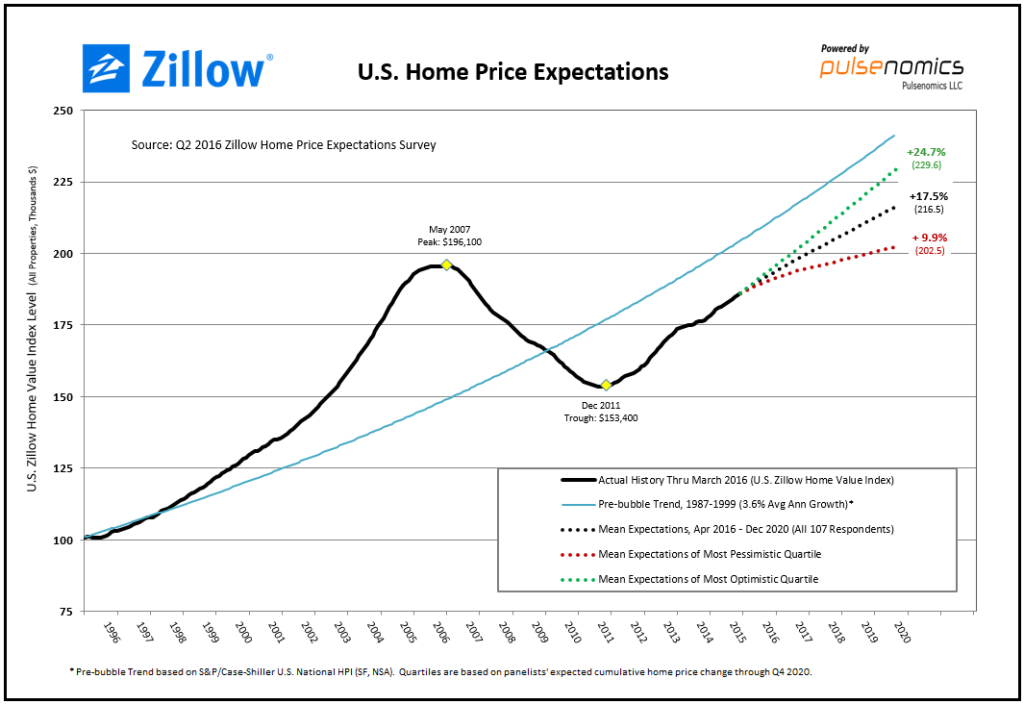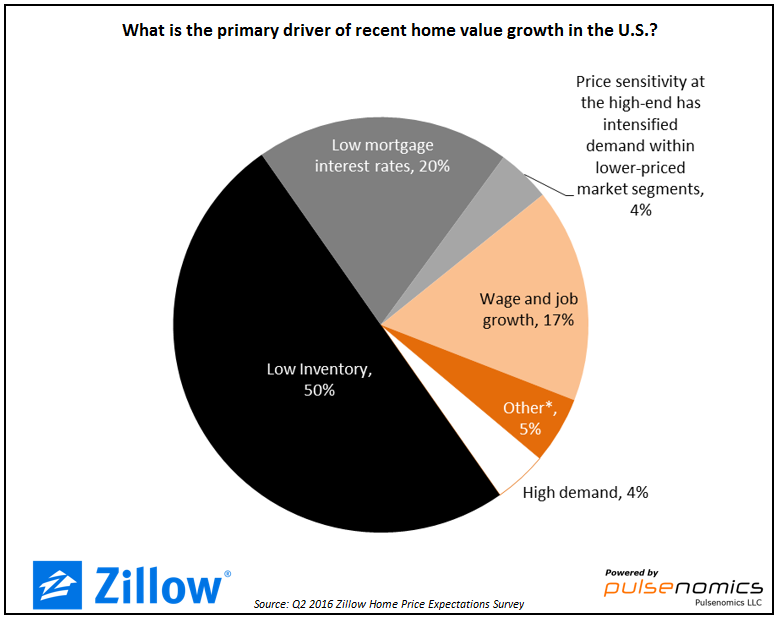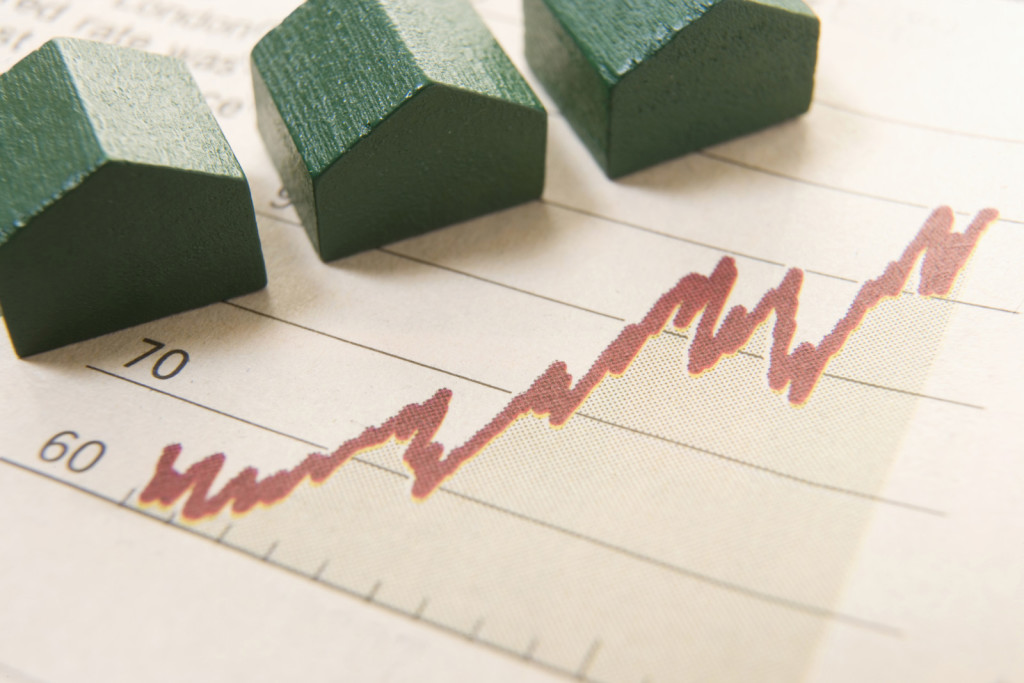Experts: Housing to Grow Steadily, But Maybe Less So if Trump, Cruz or Sanders Is Elected President
More than 100 U.S. economists, real estate experts and academics say they expect home values to grow steadily in the 3 percent to 4 percent range over the next few years. But those expectations could take a hit if presumptive Republican nominee Donald Trump or current Democratic challenger Sen. Bernie Sanders is elected president.
 •
May 17 2016
•
May 17 2016
- On average, panelists said they expected home values to end 2016 up 4 percent year-over-year, a slight bump in expectations of 3.7 percent annual growth for this year the last time the survey was conducted.
- Panelists said the potential election of Ohio Governor John Kasich and former Secretary of State Hillary Clinton as president would likely contribute to more favorable or neutral expectations for home values and the overall performance of the U.S. economy.
- Panelists’ expectations were more likely to be negatively impacted by the election of New York businessman Donald Trump, Sen. Bernie Sanders or Sen. Ted Cruz.
More than 100 U.S. economists, real estate experts and academics say they expect home values to grow steadily in the 3 percent to 4 percent range over the next few years. But those expectations could take a hit if presumptive Republican nominee Donald Trump or current Democratic challenger Sen. Bernie Sanders is elected president.
The Q2 Zillow Home Price Expectations Survey, sponsored by Zillow and administered by Pulsenomics LLC, asked a panel of 107 experts nationwide to offer their expectations for home value growth through 2020, as well as how the election of various presidential candidates might impact their view. [1] Among those panelists expressing an opinion, 45 percent said a Trump presidency would impact their expectations for future home value growth either very negatively or somewhat negatively, compared to just 16 percent who said their expectations would be impacted somewhat or very positively.
The election of Hillary Clinton, Trump’s likely Democratic opponent in the presidential race, was likely to have a more positive impact on panelists’ expectations for home value growth going forward. A third of those with an opinion (33 percent) said the election of Hillary Clinton would have a somewhat or very positive effect on their home value forecast, compared to 16 percent saying her election would have a somewhat or very negative impact.
Panelists were also asked to evaluate their expectations for the future of housing finance reform and their overall economic outlook over the next few years depending on which of the presidential candidates were to be elected. A majority of those with an opinion (59 percent) said their overall economic outlook would be very or somewhat negatively impacted if Trump were to win the presidency, while 48 percent said their expectations for housing finance reform would be somewhat or very negatively impacted.
The experts were more neutral on the impact a Hillary Clinton presidency might have on housing finance reform and the overall economy. Of those with an opinion, 31 percent said their outlook for housing finance reform would be somewhat or very positively impacted if Hillary Clinton were elected president, compared to 26 percent who said their outlook would be somewhat or very negatively impacted. On the economy overall, 30 percent said a (second) President Clinton would somewhat or very positively influence their overall economic outlook, while 29 percent said their view would be somewhat or very negatively swayed.
When asked why Trump would impact their expectations so negatively, panelists largely pointed to his inconsistency on policy, unpredictability as a candidate and lack of political experience. Panelists were more encouraged by Clinton’s more centrist leanings and pro-housing stances, as well as her obvious ties to the prosperous years of the 1990s when her husband was president. Still, some panelists also expressed reservations over her likely propensity to add more regulatory burdens and the impact those may have on economic growth.
 But while Clinton and Trump are the odds-on favorites to win their respective party’s nominations this summer, neither candidate’s election would have the most negative or most positive impact on panelists’ housing market and economic expectations. The relatively centrist views of Ohio Governor John Kasich, and his experience as House Budget Committee Chairman under President Bill Clinton during the 1990s economic boom, were most likely to brighten panelists’ expectations. Of those with an opinion, only 3 percent of panelists said a Kasich election would negatively impact their home value forecast. Just 7 percent said their expectations for housing finance reform would be negatively impacted by Kasich, and only 5 percent said their overall economic outlook would be dented by his election.
But while Clinton and Trump are the odds-on favorites to win their respective party’s nominations this summer, neither candidate’s election would have the most negative or most positive impact on panelists’ housing market and economic expectations. The relatively centrist views of Ohio Governor John Kasich, and his experience as House Budget Committee Chairman under President Bill Clinton during the 1990s economic boom, were most likely to brighten panelists’ expectations. Of those with an opinion, only 3 percent of panelists said a Kasich election would negatively impact their home value forecast. Just 7 percent said their expectations for housing finance reform would be negatively impacted by Kasich, and only 5 percent said their overall economic outlook would be dented by his election.
On the other hand, with his far-left taxation plans and increased reliance on federal intervention in markets, Sen. Bernie Sanders of Vermont was most likely to bring panelists’ expectations down: 59 percent of panelists with an opinion said Sanders’ election would somewhat or very negatively influence their home value forecasts; 65 percent said their outlook for housing finance reform would be very or somewhat negatively swayed by a President Sanders; and a whopping 76 percent said their overall economic outlook was likely to be somewhat or very negatively impacted by a Sanders presidency.
And what of Sen. Ted Cruz of Texas, until recently Trump’s main competition for the Republican nomination? Wary of his combative tactics and relatively extreme policy stances, panelists rated him only slightly more favorably than Sanders. Of those with an opinion, 42 percent said a Cruz election would negatively impact their home value forecast; 53 percent said a President Cruz would negatively impact their expectations for housing finance reform; and 54 percent said his election would dampen their overall economic outlook.
Faster Growth in Home Values: Blame Low Inventory, Not Low Interest Rates
 On average, panelists said they expected home values to end 2016 up 4 percent year-over-year, a slight bump in expectations of 3.7 percent annual growth for this year the last time the survey was conducted. Looking farther ahead, panelists on average said they expected the annual pace of home value appreciation to slow to 3.4 percent in 2017, just over 3 percent in 2018 and 2019, and to 2.8 percent in 2020.
On average, panelists said they expected home values to end 2016 up 4 percent year-over-year, a slight bump in expectations of 3.7 percent annual growth for this year the last time the survey was conducted. Looking farther ahead, panelists on average said they expected the annual pace of home value appreciation to slow to 3.4 percent in 2017, just over 3 percent in 2018 and 2019, and to 2.8 percent in 2020.
After briefly slowing down in late 2014 and into early 2015, the pace of U.S. home value growth has re-accelerated somewhat in recent months. When asked to identify the main reason for this uptick, half of all panelists with an opinion pointed to low inventory of homes for sale, which when combined with high demand can put upward pressure on the prices of those homes that are for sale and the value of homes around them. Another 20 percent of respondents with an opinion cited low mortgage interest rates as the main driver of faster home value growth lately, with another 17 percent noting strong wage and job growth. Low mortgage interest rates and strong employment and wage growth can all contribute to increased demand for housing.
 But while low mortgage interest rates are contributing somewhat to the faster pace of home value appreciation lately, panelists said they did not think these interest-rate-driven increases were unsustainable. Panelists were asked if monetary policies explicitly intended to help keep mortgage interest rates low were contributing to an unsustainable increase in U.S. home values. Almost two thirds of respondents with an opinion (64 percent) said no.
But while low mortgage interest rates are contributing somewhat to the faster pace of home value appreciation lately, panelists said they did not think these interest-rate-driven increases were unsustainable. Panelists were asked if monetary policies explicitly intended to help keep mortgage interest rates low were contributing to an unsustainable increase in U.S. home values. Almost two thirds of respondents with an opinion (64 percent) said no.
When divided into more optimistic and more pessimistic camps, panelists’ expectations diverged a decent amount. The most optimistic quartile of panelists said they expected U.S. home values to rise 4.8 percent through the end of this year. The most pessimistic 25 percent of panelists said they expected home values to rise just 3.2 percent year-over-year through 2016.
Median U.S. home values peaked at $196,100 in May 2007. On average, panelists said they expected the median U.S. home value to surpass this peak by September 2017 – more than a decade after pre-recession peaks.
[1]Survey conducted April 25-May 5, 2016. At the survey’s outset, five candidates were still actively campaigning for their party’s nomination for president: Donald Trump, John Kasich and Ted Cruz for the Republican nomination; and Hillary Clinton and Bernie Sanders for the Democratic nomination.



